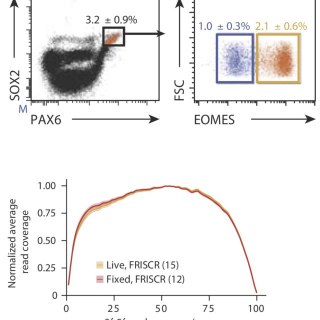
Technology Development
Quantitative predictive biological studies are facilitated by well defined cell culture environments; improvements in measuring cell state (inferred by gene and protein expression) in real-time, in situ, and heterogeneous populations; and versatile data analysis tools that help identify meaning from large and noisy datasets. The Doyle group develops experimental, engineering, and computational analysis methods on an as-needed basis to better address our long-term scientific questions about progenitor cell mechanobiology. FRISCR (Fixed and Recovered Intact Single Cell RNA) enables recovery of high quality RNA from fixed and permeabilized cells, allowing intracellular labeling and purification prior to RNA analysis. This method allows next generation sequencing to be applied to cells that lack live markers, a frequent challenge in heterogeneous mixtures of differentiating cells. Recently we have developed computational tools enabling automated identification of molecular networks from large literature repositories (millions of articles) or user-selected cell functions.



